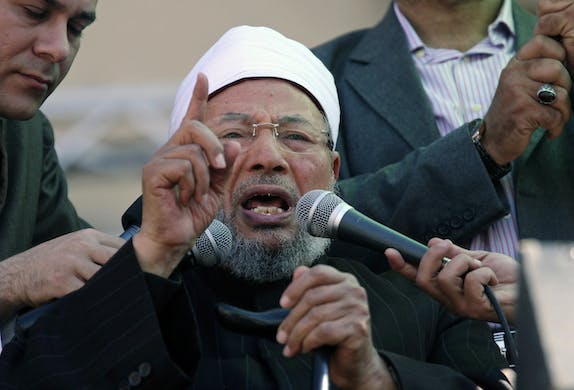Qatar’s Course Bears Watching After Death of Influential Islamist Preacher
Sheikh Yusuf Qaradawi long promoted the terrorist group Muslim Brotherhood’s ideals. Will the emirate now turn into what it has always pretended to be, a soccer-loving, forward-looking Arab powerhouse?

Will Qatar’s embrace of Islamist zealotry end with today’s death of a firebrand preacher, Sheikh Yusuf Qaradawi? Will it turn the emirate into what it has always pretended to be, a soccer-loving, forward-looking Arab powerhouse?
Qaradawi had an oversize influence in the Arab world and beyond through his weekly sermon, “Ash-Shariah wal-Hayat,” or “Islamic Law and Life,” on the Doha-based Al Jazeera Arabic. In it, he promoted the Muslim Brotherhood’s ideals and attacked America, Israel, Saudi Arabia, and his native Egypt.
How close were the ties between Qaradawi and the Qatari leadership? While on a visit to Doha a few years ago, I asked why, during a televised iftar meal marking the break of the daily Ramadan fast, the preacher was strategically seated next to the emir, Tamim bin Hamad Al Thani. My hosts patiently explained that Qaradawi gained the highly coveted spot because he was the eldest of the participants.
In reality, Qaradawi had been a mentor to the young emir, and helped in shaping an ideology and politics that raised much concern in the West and angered Arab regimes. Qaradawi both influenced Doha’s policies and was the Emirate’s mouthpiece.
He “was among, if not the, crown jewel of Al Jazeera, which is the crown jewel of Qatar itself,” a senior vice president for research at the Foundation for Defense of Democracies, Jonathan Schanzer, told the Sun. The preacher has “played a role that was carved out for him by the Doha regime.”
Growing up in Egypt, Qaradawi was heavily influenced by the Muslim Brotherhood movement, founded by Hassan al-Banna a few years before he was born at a small village on the Nile delta. Cairo’s nationalist president at the time, Gamal Abdel Nasser, saw the Brotherhood as a major threat to his secular, pro-Soviet regime. In 1960 the young preacher fled his homeland for Qatar.
Once there, Qaradawi thrived, especially after Qatar launched Al Jazeera. As the new pan-Arab satellite channel grew, Qaradawi became the Muslim world’s Elmer Gantry, issuing fatwas that raised Islamist passions and led to major acts of violence.
“Qaradawi became the new Hassan al Banna,” the Middle East Media Research Institute’s president and founder, Yigal Carmon, told the Sun. “He, and Qatar through Al Jazeera, have been the world’s top state sponsor of terrorism.”
At the height of the Iraq war, in which he urged Muslims to attack Americans, Qaradawi said that “by opening our ports, our airports, and our land, we are participating in the war,” and “we will be cursed by history because we have helped the Americans.” He made the pronouncement even though Qatar hosts the largest American airbase in the region, Al Ubaid.
After strongly backing Doha in a decades-long dispute with the Saudi monarchy, Qaradawi nevertheless at one point reversed himself, saying he’d been wrong and that a previous Saudi king was “a dear friend of mine.”
Mostly, as Memri documented, Qaradawi was a fierce critic of Christians, the West, and Jews. Christmas should not be celebrated in Muslim lands, he said, and he attacked the Western habit of allowing women to travel without male supervision. He often said Jews were the “sons of monkeys and pigs.”
Allah, Qaradawi preached, “imposed Hitler upon the Jews to punish them,” and warned that the next time it would be “at the hand of the believers” that the Jews would be exterminated. He became an avid supporter of Palestinian suicide bombings in Israeli cities in the mid-2000s, and was a big supporter of Hamas.
Ties with the Muslim Brotherhood-affiliated Hamas were helpful in positioning Qatar as a go-between. Once Hamas seized control over Gaza in 2005, the Qataris became its top financier, sending suitcases full of cash to Hamas bigwigs. Jerusalem approved of the cash deliveries in the hope of gaining temporary relief from Gaza violence without the need to wage a full-scale war. The calm always proved temporary, indeed.
Qaradawi managed to return to his homeland in 2011. Appearing at Cairo’s Tahrir Square next to Mohammad Morsi, a Brotherhood leader who won an election in the aftermath of the overthrow of President Mubarak, Qaradawi became a champion of the overthrow of Arab despots in the so-called Arab Spring.
As a result of his new stance, Westerners started hailing Qaradawi as a political “reformer,” while ignoring the fanatic record he preached. He “has been a great defender of the political liberalization of the Islamic world and a staunch antagonist of authoritarianism — something that made him a much-hated figure among regimes in the region,” a Mideast scholar at London’s King’s College, Andreas Krieg, tweeted today.
Ignoring the ties to Islamists and terrorists, Westerners have heaved such praise at Qatar and its Al Jazeera mouthpiece for years.
As his health deteriorated, Qaradawi all but disappeared from public view in the last few years. Qatar’s war with the Saudis then cooled off somewhat, and the emir made up with Egypt. “They want to pass the World Cup without much regional turmoil,” Mr. Carmon said, referring to the upcoming global soccer tournament.
Yet, he added, in the long run Doha is unlikely to sever ties with the Islamist terrorist groups that it has sponsored for so long.

